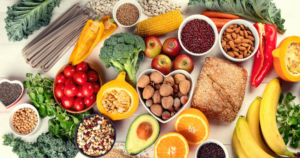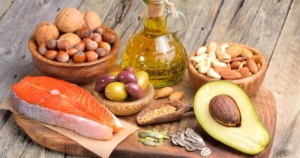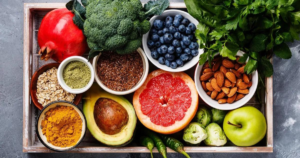Losing weight is a common goal for many people, and it often starts with making changes to your diet. A well-balanced and effective weight loss diet can help you shed those extra pounds and improve your overall health. In this comprehensive guide, we will explore the best and most unique strategies for achieving your weight loss goals through diet. From understanding the basics of calorie balance to exploring various diet plans, we’ve got you covered.
1. Understanding the Fundamentals of Weight Loss:
Before diving into the specifics of a weight-loss diet, it’s crucial to understand the fundamental principles behind losing weight:
- Calorie Balance: The cornerstone of weight loss is achieving a calorie deficit, which means you consume fewer calories than your body needs for daily maintenance. Your body must use stored fat for energy because of this shortage, which causes weight loss.
- Metabolism: Learn how your metabolism affects your ability to lose weight and how to boost it naturally through dietary choices and lifestyle changes.
2. Designing Your Weight Loss Diet Plan:
Now that you grasp the basics, it’s time to create a personalized weight loss diet plan that suits your needs and preferences.
- Setting Realistic Goals: Setting achievable weight loss goals is essential. Learn how to set targets that are both realistic and motivating.
- Identifying Your Dietary Preferences: Explore various diet preferences, such as vegetarian, vegan, low-carb, and more, and find the one that works best for you.
- Portion Control: Master the art of portion control to avoid overeating and stay within your calorie limits.
- Meal Timing: Discover the impact of meal timing on weight loss and learn when and how often to eat for the best results.
3. Best Foods for Weight Loss:
In this section, we’ll delve into the best foods that can aid in your weight loss journey:
Lean Proteins

Lean proteins, such as chicken breast, turkey, fish, tofu, and legumes, are low in fat and essential for a healthy diet. Rich in amino acids, they support muscle development, aid in weight management, and contribute to overall well-being. Incorporating these lean sources into meals helps maintain a balanced and nutritious diet.
Fiber-Rich Foods

Fiber-rich foods promote digestive health, aid weight management, and support heart health. Whole grains like oats and quinoa, legumes such as beans and lentils, fruits like apples and berries, and vegetables like broccoli and Brussels sprouts are excellent sources. Including these foods in your diet can enhance overall well-being and prevent constipation.
Healthy Fats

Healthy fats, such as those found in avocados, nuts, seeds, and olive oil, play a crucial role in supporting overall well-being. Rich in omega-3 fatty acids, they promote heart health, aid in nutrient absorption, and contribute to brain function. Including these fats in a balanced diet helps maintain optimal body functions.
Superfoods

Superfoods are nutrient-dense foods packed with vitamins, minerals, and antioxidants, promoting overall health. Examples include blueberries, kale, quinoa, and salmon. Incorporating these into your diet may boost energy, improve immunity, and support weight management. However, a balanced diet with a variety of foods is essential for optimal health.
4. Unique Approaches to Weight Loss:
Explore some unique strategies that can give your weight loss diet an extra edge:
- Intermittent Fasting: Learn about intermittent fasting, its benefits, and different approaches to incorporating it into your diet plan.
- Mindful Eating: Discover how mindful eating can help you develop a healthier relationship with food and reduce overeating.
- Metabolism-Boosting Foods: Explore a list of foods known to boost metabolism and aid in weight loss.
- Cheat Days and Refeeds: Understand the role of cheat days and refeed days in maintaining long-term diet adherence.
5. Staying Motivated and Overcoming Challenges:
Weight loss can be challenging, but maintaining motivation is key. This chapter provides tips to help you stay on track.
- Tracking Progress: Learn how to track your progress effectively to stay motivated.
- Overcoming Plateaus: Discover strategies to break through weight loss plateaus when your progress stalls.
- Dealing with Cravings: Find ways to curb cravings and avoid binge eating.
- Emotional Eating: Recognize your emotional eating triggers and how to manage them.
Frequently Asked Questions
Q: What is the best diet for weight loss?
Each person has a different optimum diet for losing weight. It depends on your preferences, lifestyle, and dietary needs. Common options include low-carb diets, Mediterranean diets, and balanced calorie-restricted diets.
Q: How many calories should I eat to lose weight?
The number of calories you should consume for weight loss depends on factors like your age, gender, activity level, and current weight. To calculate your calorie needs, speak with a medical practitioner or utilize internet calculators.
Q: What are some healthy weight loss foods?
Healthy weight loss foods include lean proteins (e.g., chicken, fish, tofu), fruits and vegetables, whole grains (e.g., quinoa, brown rice), legumes (e.g., beans, lentils), and foods rich in fiber.
Q: Can I lose weight without exercising?
Yes, you can lose weight through diet alone, but incorporating regular exercise can enhance weight loss and improve overall health.
Q: Is eating an extremely low-calorie diet safe?
Only under medical supervision can very low-calorie diets be used. They are normally only given to those who have a serious medical problem, such as extreme obesity.
Q: What is intermittent fasting, and does it help with weight loss?
There are cycles between eating and not eating when you intermittently fast. Some studies suggest it may aid in weight loss and improve metabolic health. However, it may not be suitable for everyone, and consulting a healthcare professional is recommended.
Q: How can I overcome cravings for unhealthy foods?
Overcoming cravings can be challenging. Strategies include drinking water, distracting yourself, practicing mindfulness, and ensuring you have healthy snacks readily available.
Q: What role does water play in weight loss?
Drinking water can help control appetite, promote a feeling of fullness, and support metabolism. Staying hydrated is essential for overall health, including weight management.
Q: Are there any weight loss supplements that work?
Some supplements claim to aid in weight loss, but their effectiveness varies. Consult with a healthcare provider before taking any supplements, and remember that diet and exercise remain the primary tools for sustainable weight loss.
Q: How do I maintain my weight after reaching my goal?
To maintain your weight, continue to eat a balanced diet, stay active, monitor your progress, and be mindful of portion sizes. Weight maintenance is an ongoing process.
Q: Is it typical to go through weight changes while trying to lose weight?
Yes, weight fluctuations are normal. Factors like water retention, hormonal changes, and dietary changes can lead to temporary weight fluctuations. Rather than focusing on daily fluctuations, consider long-term patterns.
[blockquote align=”none” author=””]
Final Thoughts
Embarking on a weight loss journey through diet requires knowledge, commitment, and patience. By understanding the fundamentals of weight loss, designing a personalized diet plan, incorporating the best foods, and exploring unique approaches, you can achieve your weight loss goals. Stay motivated, stay consistent, and remember that a healthy weight loss diet is not a quick fix but a sustainable lifestyle for better health and well-being.
[/blockquote]
